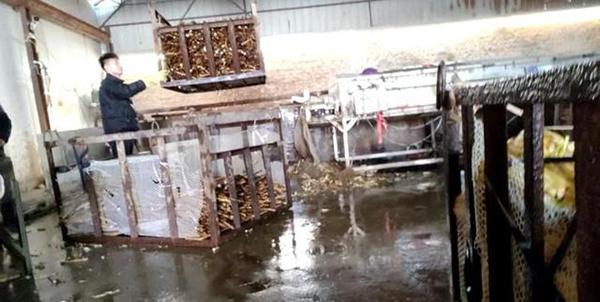Recently, the chaos of "yam transfiguration" has aroused social concern after the media exposure. The original yellow-brown yam, after diluting sodium hypochlorite bleaching, it shines white, and then rinsed with water, white and tender like lotus knots. Sodium hypochlorite is the main component of 84 disinfectant solution, which is corrosive and allergenic to the human body.

Workers use a crane to move a basket of yam into a pool of medicine. Network diagram
When agricultural products are sold well, the selling price will be high, which has become a common phenomenon. A few days ago, a couple of farmers in Hebei harvested 650 kilograms of spinach and sold it to local vendors, with a total transaction price of only 15 yuan. In local supermarkets, boxed spinach averages more than 4 yuan per kilogram, and some boxed spinach cost more than 8 yuan per kilogram. In addition to the intermediate channel fee, the main difference between the two is that the spinach in the supermarket is the same length and bright color, which is specially selected to sell well in the box.
In order to make the food marketable and extend the shelf life, some unscrupulous traders will illegally add some additives to the food, including the use of chemical drugs banned by the state. Sodium hypochlorite, like the "bleaching" of yams, was banned as a food additive by the General Administration of Quality Supervision, Inspection and Quarantine as early as 2011.
Similar use of illegal chemicals to "beauty" agricultural products is not an isolated case. According to the criminal judgment issued by a court in Guangdong, in order to make the peeled taro and potatoes bright in color and prolong the storage time, the defendant illegally soaked sodium metabisulfite and citric acid monohydrate in water to soak the peeled taro and potatoes, and then used them for sale.
Even food-grade additives lack certain standards for use in fresh produce. Not long ago, dyed chives appeared in many vegetable farms. After testing, the Bordeaux liquid was used on these chives. This chemical is widely used in agricultural production as a broad-spectrum fungicide and preservative, but there are no norms and standards for the use of chives.
Different from the formal packaged food in the production, packaging of all aspects of the clear provisions, the primary processing of agricultural products is more scattered, strong concealment, to a certain extent there are safety supervision loopholes. In this regard, large supermarkets and wholesale markets should strictly control the entrance and strengthen the detection of agricultural products entering the market. The market supervision department should take a step forward and directly connect with farmers and processors to make illegal "beauty" agricultural products have no living space.
While strengthening market supervision, relevant parties should also carry out relevant science popularization for consumers and guide the change of consumption concepts, not only paying attention to the appearance and appearance of agricultural products, but also forming a healthy and ecological cognition. Through the correct concept of agricultural product consumption, the market is forced to make corresponding improvements.
Fang Xiang/Wen